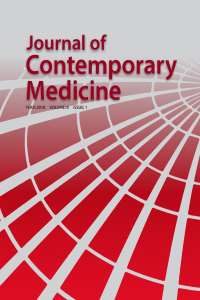Laparoskopik Appendektomi : Nöroma - Olgu Sunumu
63 yaşında erkek hasta yaklaşık bir haftadır olan karın ağrısı şikayeti ile başvurdu.Yapılan fizik muayenede sağ alt kadranda minimal hassasiyet ve laboratuvar incelemesinde lökosit değeri normal olarak saptandı. Klinik takibinde problemi olmayan hasta medikal tedavi ile taburcu edildi. Taburculuğu takiben bir hafta içinde çekilen kontrol bilgisayarli tomografide apendiks duvarı hafif kalın, apendiksin çekuma açıldığı alanda şüpheli kalınlaşma izlenmesi üzerine plastrone apandisit şüphesi ile sefuroksim aksetil ve ornidazol antibiyoterapisi düzenlenerek yaklaşık altı hafta sonra laparoskopik apendektomi yapıldı. Postoperatif ikinci gün oral alımı takiben klinik problemi olmaması üzerine taburcu edildi. Patoloji nöroma, fibroz obliterasyon olarak bildirildi. Apendiks mukozal bariyeri bir kez bozulduğunda, apendiks duvarında sekonder infeksiyona bağlı bakteri invazyonu ve inflamasyonu başlar. Antibiyotiklerin uygulamasıyla inflamasyon kontrol altına alınabilir, mukoza tamiri olur ve apendektomi yapılmadan iyileşme ile sonuçlanabilir. Ayrıca plastron gelişimi, organizmanın enflamasyonu kendi imkanları ile sınırlandığı gösterir. Gecikmiş plastron apandisitli hastalar yoğun antibiyotik ve destek tedavisi ile yakın takipte tutulabilirler. Akut dönem atlatıdığında 6-8 hafta sonra elektif koşullarda apendektomi yapılır. Çok nadir olarak, apendiksin stromasında bulunan nöroendokrin hücrelerinin proliferasyonu ve bunun sonucunda da nöral dokuda hiperplazinin tetiklendiği apendiks nöroması oluşmaktadır. Oblitere apendikste,tekrarlayan küçük iltihabi atakların apendiksin stromasında bulunan nöroendokrin hücrelerinin proliferasyonuna neden olarak apandisit tablosuna yol açtığı öne sürülmektedir. Bu olgu sunumu laparoskopik apendektomi ile tedavi edilen bir apendiks nöroma tanımlamaktadır.
Anahtar Kelimeler:
plastron apandisit, nöroma, laparoskopi
Laparoscopic appendectomy: neuroma - case report
63-year-old male patient with one week abdominal pain had minimal tenderness in the right lower quadrant. His complaint with the laboratory examination had revealed normal leukocyte value. During the clinical follow-up the patient was discharged with medical therapy. After a week following discharge computed tomography was determained that he had a thick appendix and cecum with clinically suspect of plastron appendicitis. The ornidazol and cefuroxime axetil were taken around six weeks. Consequently after the medication, laparoscopic appendectomy was performed. Postoperatif second day he was discharged on the lack of clinical problems following oral intake. Pathology reported neuroma obliteration as fibrosis. Mucosal barrier is disrupted once again when the appendix wall in secondary infections due to the bacterial invasion and inflammation. The inflammation can be controlled with the application of antibiotics, may result in mucosal healing and repair without an appendectomy. In addition, development of the plastron shows inflammation of the organism is limited by their own means. Delayed plastron appendicitis patients are kept in close follow-up and support with intensive antibiotic therapy. When the acute period established the elective appendectomy could be performed after 6-8 weeks. Very rarely, appendix proliferation of neuroendocrine cells in the stromaAs a result of the triggering of the appendix , it consists of neural hyperplasia. Obliterated in the appendix, a small appendix of recurrent inflammatory attacks causing proliferation of neuroendocrine cells in the stroma has been suggested to lead to appendicitis. This case report describes an appendix neuroma treated with laparoscopic appendectomy.
Keywords:
plastrone appandicitis, laparoscopy, neuroma,
___
- 1)Maresch M. Ueber das Vorkommen neuromartiger Bildungen in obliterierten Wurmfortsätzen. Wien Klin Wochensch 1921;34:181–182.
- 2) Masson MP. Les lésions nerveuses de láppendicite chronique. C R Acad Sci (Paris) 1921:262–264.
- 3) Rhoades T, Lohr J, Jennings M. Symptoms of Acute Appendicitis Caused by Primary Neuroma of the Appendix. Am Surg 2007;73:841.
- 4) Tatekawa H, Tanikake M, Yoshida S et al. Multidetector CT findings of neurogenic appendicopathy. Eur J Radiol 2011;77(2):47-53.
- 5) Gupta K, Solanki A, Vasishta RK. Appendiceal neuroma: Report of an elusive neuroma. Trop Gastroenterol 2011;32(4):332–333.
- 6) Di Sebastiano P, Fink T, di Mola FF et al. Neuroimmune appendicitis. Lancet 1999 354:461–466.
- 7) Partecke LI, Thiele A, Schmidt-Wankel F et al. Appendicopathy—a clinical and diagnostic dilemma. Int J Colorectal Dis 2013; 28:1081–1089.
- 8) Díaz-Flores L, Gutiérrez R, Díaz-Flores L Jr, Goméz MG, Sáez FJ, Madrid JF. Behaviour of telocytes during physiopathological activation. Semin Cell Dev Biol. In press 2016.
- 9-Patel AV, Friedman M, MacDermott RP. Crohn's disease patient with right lower quadrant abdominal pain for 20 years due to an appendiceal neuroma (Fibrous obliteration of the appendix).Inflamm Bowel Dis 2010;16(7):1093-1094
- Yayın Aralığı: Yılda 6 Sayı
- Başlangıç: 2011
- Yayıncı: Rabia YILMAZ
Sayıdaki Diğer Makaleler
Hossein ASGAR POUR, Safiye ÖZVURMAZ
Bariatrik Cerrahi Cinselliği Etkiler Mi? Sistematik Derleme
Orta Anadoluda Üçüncü Basamak Bir Hastanede Non-Steroid Anti-İnflamatuar İlaç Reçeteleme Tercihleri
Ege Ağırman, Mehmet Ziya Gençer
Laparoskopik Appendektomi : Nöroma - Olgu Sunumu
Yuksel Altınel, Bahar Büşra Özkan, Ayça Sultan Şahin, Semih Arıcı
Çeşitli Yaş Dönemlerinde Pelvik Taban Kas Kuvveti ve Etkileyen Faktörlerin İncelenmesi
Nergis Aşgın, Elçin Kal Çakmaklıoğulları
